
|
The world of non-commercial film and A-V |
Events Diary | Search | ||
| The Film and Video Institute | | ||||
The making of An Amateur Auteur
An Amateur Auteur won a Diamond Award and the Best British Entry Award at BIAFF 2008. It was also selected as part of the programme to represent Britain at the UNICA 2008 Festival.
Paul Kittel writes about why he and his wife, Anna, decided to make a film about his dad.
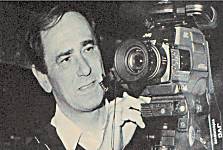 Peter Kittel - An Amateur Auteur
Peter Kittel - An Amateur Auteur
On a cold day in spring 1991, our car laboured silently to London. I was with my mum, sister and some close friends, heading to the London Amateur Film Festival. It was an event we'd been to many times before but this year was different. Our latest film, An Honest Day's Work, was one of the lucky ones selected to be screened. The man who'd written, shot, directed and edited the production was my dad, Peter Kittel. A few days earlier he had collapsed on his way to work: dead at the age of 52. Among the many aspects of his life that he'd left incomplete was the knowledge that he'd won a Silver Seal Award: the best he'd ever win from the IAC.
His love of film-making began in his early teens when he started playing with his dad's 9.5mm camera. He graduated to 16mm, through to Standard and Super 8 before becoming a Super-VHS convert in the late nineteen-eighties. Every year he'd make a drama film and every year he'd faithfully enter it into the IAC festivals, hoping that it would do better than the last.
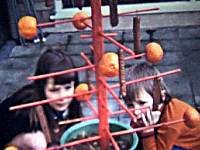 |
 |
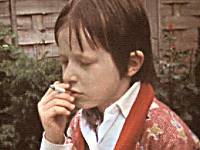 |
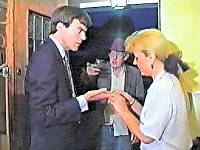 On that day in 1991,
the festival crowd greeted An Honest Day's Work with warm applause
and I thought the final curtain had descended on my dad's favourite hobby.
But it proved to be a false ending. Within months, members of his club, the
Harrow Cine and Video Society, organised a youth film competition
in his memory. The competition ran for many years and I hope will run again.
On that day in 1991,
the festival crowd greeted An Honest Day's Work with warm applause
and I thought the final curtain had descended on my dad's favourite hobby.
But it proved to be a false ending. Within months, members of his club, the
Harrow Cine and Video Society, organised a youth film competition
in his memory. The competition ran for many years and I hope will run again.
Dad's closest friend, Brian Reid, became a standard-bearer of his memory. At family get-togethers, Brian would reminisce at length about each of the films. He'd recall every incident, shoot and location in exceptional detail. Dad and Brian had gone back a long way. They'd met in the 'fifties when they were in their late teens, forming a formidable double-act. Dad was the straight man, hidden behind the camera: Brian was the extrovert, playing the lead in nearly every film they made. They were Best Man for each other's weddings and their wives became great friends. My sister and I grew up with Brian's two sons.
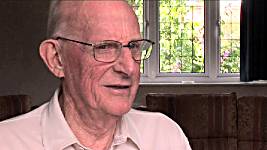 A couple of years ago, when
Brian turned seventy, there was only one present I could think of for him:
a DVD transfer of all the old Super 8 films. I decided to do the transfer
myself, painstakingly sifting through each of the spools, watching them as
they were digitised onto my laptop. My wife, Anna, who had never known
my dad, watched them with me. I think it gave her insights into both the
father-in-law she'd never known and my eccentric upbringing, which was measured
in fifty-foot reels of celluloid. Anna, who has become a film-maker since
we met, has a great eye for detail. She wondered if we could do something
more with the old films. Perhaps we could make a documentary about him.
A couple of years ago, when
Brian turned seventy, there was only one present I could think of for him:
a DVD transfer of all the old Super 8 films. I decided to do the transfer
myself, painstakingly sifting through each of the spools, watching them as
they were digitised onto my laptop. My wife, Anna, who had never known
my dad, watched them with me. I think it gave her insights into both the
father-in-law she'd never known and my eccentric upbringing, which was measured
in fifty-foot reels of celluloid. Anna, who has become a film-maker since
we met, has a great eye for detail. She wondered if we could do something
more with the old films. Perhaps we could make a documentary about him.
She said that dad's story had some great elements. True, there was plenty of source material, character, narrative, irony, peaks and troughs. There was also parallel history of the development of amateur film-making from black-and-white to colour; silent to sound; film to video. His films also reflected the times they came from. One film was about a Russian violinist who defected to Britain at the height of the Cold War. Another film dared to ask what life might be like after a nuclear holocaust. On a more trivial level, haircuts and clothing provided a light-hearted lesson in contemporary fashion.
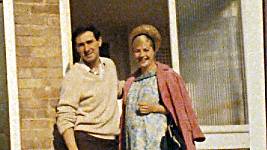 |
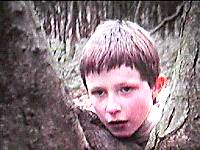 |
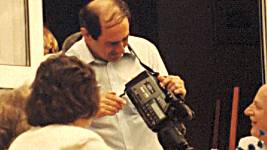 |
A Kind of Love Story
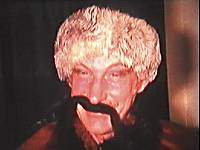 Anna's
idea had great potential but we were in danger of running away with ourselves.
We had to stop and ask why anyone could possibly be interested in a film
about my dad. He certainly wasn't a great film-maker in the traditional sense.
He never won any major awards and, to be frank, some of the films were a
little ropey. If he had been a great film-maker, our documentary would have
been easier to make. It would have been a straightforward celebration of
an artist whose genius was never in doubt. Our film had to reach for something
subtler.
Anna's
idea had great potential but we were in danger of running away with ourselves.
We had to stop and ask why anyone could possibly be interested in a film
about my dad. He certainly wasn't a great film-maker in the traditional sense.
He never won any major awards and, to be frank, some of the films were a
little ropey. If he had been a great film-maker, our documentary would have
been easier to make. It would have been a straightforward celebration of
an artist whose genius was never in doubt. Our film had to reach for something
subtler.
We decided to make it into kind of love story, about a man who did his best for his family, died young, and left a wonderful, personal legacy on film. Our intention was for the audience to enjoy, rather than scrutinise, his films' weaknesses. Unconvincing acting or dodgy effects would be hailed as the very quirks that made the films and my dad, special.
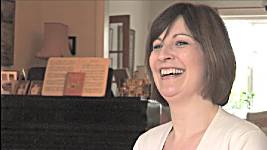 Like all love stories,
intimacy is the key. A detached voice-over wouldn't convey the same warmth
as someone presenting to camera. And we didn't just want a 'gob on a stick'.
The presenter had to be someone who had had a personal relationship with
dad. This approach to telling the story would also help us overcome a major
visual problem. Although I had box-upon-box of dad's films, I had very little
footage of him because his place was always firmly behind the camera. An
on-screen presenter could fill in some of these gaps.
Like all love stories,
intimacy is the key. A detached voice-over wouldn't convey the same warmth
as someone presenting to camera. And we didn't just want a 'gob on a stick'.
The presenter had to be someone who had had a personal relationship with
dad. This approach to telling the story would also help us overcome a major
visual problem. Although I had box-upon-box of dad's films, I had very little
footage of him because his place was always firmly behind the camera. An
on-screen presenter could fill in some of these gaps.
Our thoughts immediately turned to Brian. He was used to being on camera and, in his new life as a lay preacher, had great presentational skills. The downside of choosing Brian was that by giving him a script, he would be denied the freedom to reminisce and regale the audience with his wonderful collection of anecdotes. My mum and sister could also have stepped into the presenter's shoes but they professed to be camera-shy. I don't know why because I think they both come across rather well.
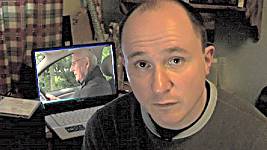 In the end,
I was thrown in front of the camera. Like my dad, it's not the side I feel
most comfortable and it showed. The first few links we filmed were over-the-top
and were quickly scrapped. Anna thought I looked like an overweening children's
television presenter. She thought that an under-stated feel would be better.
If there was any energy in the film, it should come from dad's film clips.
In the end,
I was thrown in front of the camera. Like my dad, it's not the side I feel
most comfortable and it showed. The first few links we filmed were over-the-top
and were quickly scrapped. Anna thought I looked like an overweening children's
television presenter. She thought that an under-stated feel would be better.
If there was any energy in the film, it should come from dad's film clips.
Anna and I spent several happy afternoons reminiscing with some of the people who'd been most closely involved with the films: Brian, my mum and sister and Brian's son Alex. They all bought into the film's premise that this was to be a celebration, rather than a sombre eulogy to a dead man. They recalled some great anecdotes, many of which we included but some, regrettably, we couldn't find space for. A particular favourite was the story of my poor mum asking her hair-dresser for a 'forties hairstyle for her part in one of the films. After finishing the job, the hairdresser told my mum to leave by the backdoor so none of the other customers could see the somewhat dated creation.
I'm still unsure that we got the editorial balance right but twenty-minutes felt like a good duration and we stuck to it. There were many other actors and friends we would like to have interviewed. There was also dad's involvement with Pinner Cine Society, which later become the Harrow Cine and Video Society, which I would have like to have featured more heavily.
We filmed everything on an FX-1, down-converting to DV. The film was edited on a laptop, using Adobe Premiere. Everything was cut as simply as possible. There was no need for 'bells and whistles'. There were enough of them in dad's film clips: rain storms emanating from watering cans, dead wood sprouting to life, underground springs emerging from stirrup pumps, false beards and disappearing Chinamen. We couldn't compete with that.
When Anna and I heard that the film had done so well at BIAFF 2008, we were amazed and delighted. It may have come seventeen years too late but, at last, dad has achieved his dream of winning a major IAC award. We hope the film will also serve as a reminder to our two-year old son - who's also called Peter - that this was his Granddad.
- Paul Kittel, Bucks March 2008
Share your passions.
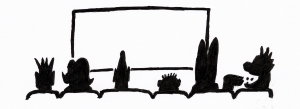
Share your stories.